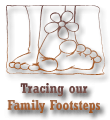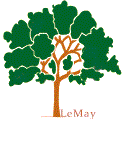|
T H E
G
E N E A L O G Y
B U G . . .
by Jody McKim |
The Passion, The Pleasure and
The Pain, of it all...
Who
can explain the genealogy bug? Most all people like to hear about their
great grandparents, where they came from and stories passed down from
one generation to the next. But typically there is only one family
member who gets bitten by the bug, called genealogy. It is truly an
infection you can't get rid of, it's passion.
-
The noun genealogy has one meaning: successive
generations of kin; synonym: family tree.
Passion for genealogy is one of the fastest growing pastimes as more and
more information is being made available through the internet. Family
historians and researchers alike are connecting with distant relatives,
whose ties had been broken, some for nearly a hundred years. Internet
friendships are formed because of mutual interest in specific
genealogical areas of research and are nurtured by support and
encouragement. These friendships are important to the lone family
historian.
All
family researchers have a starting point, when we began to wonder about
those who came before us and what was their life was like. Genealogy
involves researching, compiling names and vital dates of ancestors, both
living and deceased. After establishing the relationships based on
primary, secondary and/or circumstantial evidence or documentation, a
family tree can be created. Genealogy often referred to as family
history, involving search and discovery of the life histories of the
individuals involved, creating a life outside of just names, dates and
places.
Family researchers dig through public records, church records, census
records, immigration records and visit cemeteries, conduct oral
interviews, preserve family history, all in hopes of discovering roots
and living relatives. They also want to understand not just where and
when people lived, but their lifestyle, culture, traditions and what
motivated them. This often leads to learning the laws for the era in
which their ancestor lived, old political boundaries, immigration
trends, and historical social conditions. This can be a timely
procedure, but the passionate researcher thrives on it.
One
of the most pleasurable events is the moment you locate a relative, no
matter how distant the cousin, no matter how far the geographically
distance is between you and it doesn’t even matter if you speak the same
language. If there is a way, there is a will to communicate. The
tension rises and you feel like jumping out of your chair and shouting
hallelujah! Your spouse and children think you have lost your mind and
can't understand what the excitement is all about. What do you do
first, write a letter, call them and then - what do you say? Whether
the decision is to write or call, the anticipation of their response is
like sitting on pins and needles. Rejection is the worst thing that
could happen and it does happen.
Some
new found cousins may have no interest in genealogy and think much like
your immediate family, what's the big deal. Or they may wonder
what your personal agenda is. Dealing with a skeptic is most difficult
and sometimes it results in never leading to a follow up call or first
time meeting. One of the most important things to remember is not
to give up. You must become hardened against rejection in order to
continue the journey, because skeptics are the exception. Most people
will welcome your contact and a relationship becomes possible.
When
your initial contact is warmly received, you then experience the next
jubilee; it could be learning information which leads to breaking
through a brick wall, or putting a name on a person in mystery photo
that has been in your family for years, this happened to me. Adding
branches and twigs to your family tree, strengthens your family roots.
The opportunity to have a reunion with this new found relative will be a
memorable meeting. There is something special about looking in the eyes
of someone for the first time, who shares the same blood as you.
Secretly you look them over and watch their mannerisms in hopes of
similarities in yourself or other family members, just an extra bit of
confirmation - that you are related. Many researchers develop and
maintain relationships with new found family, often on different
continents.
Genealogical journeys to ancestral villages and towns are becoming a
favorite choice of vacation travel. It is one of the most ultimate
events in researching, walking in the steps of your forefathers, looking
up at the moon from the same town and feeling the breeze brush across
your face and wonder, did my grandmother stand here, could she have felt
the breeze too? Did she walk down this street or run through the old
cemetery?
Then
you visit the cemetery, you'll see very old graves, some fallen over
from neglect and some are just no longer there, many cases stolen. You
search diligently for your family names and if you are lucky, you find
one, two or three! You stand there in silence, almost in a state of
prayer and pay your respects to your ancestors. You may even wonder if
they know you are there, almost like they were expecting you, or could
they have led you there. Crazy thoughts - it's part of having the
genealogy bug.
One
of the first things a researcher does when finding a new relative or
break through a brick wall is notifying their genealogy friends. They
understand what the big deal is and share in the excitement.
Sometimes genealogy friends are instrumental in locating your relative
or share research resources, that's what genealogy friends do for one
another. It's a give and take partnership. Yes, there are people who
take advantage of good hearted people, who take and never give. Those
people generally fade out once they have gotten what they needed.
Even
an unsuccessful search for ancestors can lead to a better understanding
of history. The search for living relatives often leads to
family reunions, both of distant
cousins and of estranged families.
Family historians help to keep family traditions alive or reveal family
secrets.
Learning what life was like for our great grandparents can be sad at
times, particularly if their lives crossed paths with world events such
as wars, which brought hardship and pain. To know them better is to
understand their lifestyle, culture, traditions and struggles;
particularly what motivated them to make decisions, like emigrating from
one place to the other, in most cases leaving behind parents, siblings
and friends, often never seeing them again. We learn in most
cases their decisions were made in hopes of a better way of life, some
achieved their goals, while others never realized their dreams.
In
today's fast paced world, it is hard to imagine the simplicity of the
world they lived. Their daily life was hard work, planting,
harvesting, butchering; their survival depended on their own fortitude,
forever preparing. We learn what strong people they were in spite of
their obstacles! We discover their pride and determination, what better
legacy could they have left to us.
I've
never regretted starting my family research crusade. At times, I
actually feel my ancestors sitting beside me as I research, guiding me
where to look and what do to next. Spooky, maybe, but I am not the only
one who experiences this. Seeking the unknown and yearning to find
answers is something I don't think we can control; it's part of having
the genealogy bug.
If
you are a beginner into genealogy or want to start, there are many
resources available to you. Mailing lists exist for nearly every ethnic
group, county, state and city. There are literally hundreds of websites
dedicated to family research, most are for a fee to subscribe but there
are many useful sites that are free. Becoming part of a group and
sharing resources is the best way to manage your allocated money for
your beloved pastime. Be willing to give back, don't be user and don't
monopolize the time of generous people. And always say "thank you."
Get
started today, talk to all the family members - not just those you think will help. Attempt contact and involve with as many family
members you can. Take note of everything said - do not rely on your
memory! Believe me, if you begin to write everything down from the
start, you will save yourself a lot of time and regrets. Being a
retired skip tracer, I know the importance of taking notes, on even what
may seem to be an insignificant piece of information; which may lead to
be a missing piece of a puzzle one day. Make sure to notate who you
talked to and the date. Try to obtain birth, marriage and death
certificates of your relatives. You will begin to hear rumors of family
history - write it down --but don't take that as fact until
you've seen documented proof. Ask questions and try to get detailed
facts (names, dates and places) about deceased members - parents,
grandparents, aunts, uncles, etc. If possible, tape conversations,
especially with the older family members. I wish I had asked my
grandmother more questions before she passed away in 1992. Little did I
know, in a few short years later in 1999, I would begin my quest.
Find
a Genealogy software package that suits your needs - there are lots on
the market. Find one that will do pedigree charts, family group sheets,
and family registers.
Consider hiring a genealogist. Check out the Association of
Professional Genealogist to read more about locating a genealogist in
your area:
http://apgen.org/articles/hire.html
The
Church of Jesus Christ of the Latter Day Saints (Mormon) - have
excellent libraries for genealogy research and records submitted by
others who are researching their families. Join historical and
genealogical societies for the locations nearest you. Rootsweb is the
most popular genealogy website, providing databases to access and
internet mailing list to join:
http://www.rootsweb.com
Yes,
genealogy brings about passion, pleasure and pain; just as anything
worthwhile in life, you take the good with the bad, the happy with the
sad. The pleasure out weights any sadness you may find, because we can
not change the past but we can preserve it as part of our family
history. Most of all, have a good time! Genealogy is a fun hobby,
relatively inexpensive (but not always ;-); you'll make lots of new friends and find family
you never dreamed of!
Happy Hunting!
Jody McKim
2005 |
|

